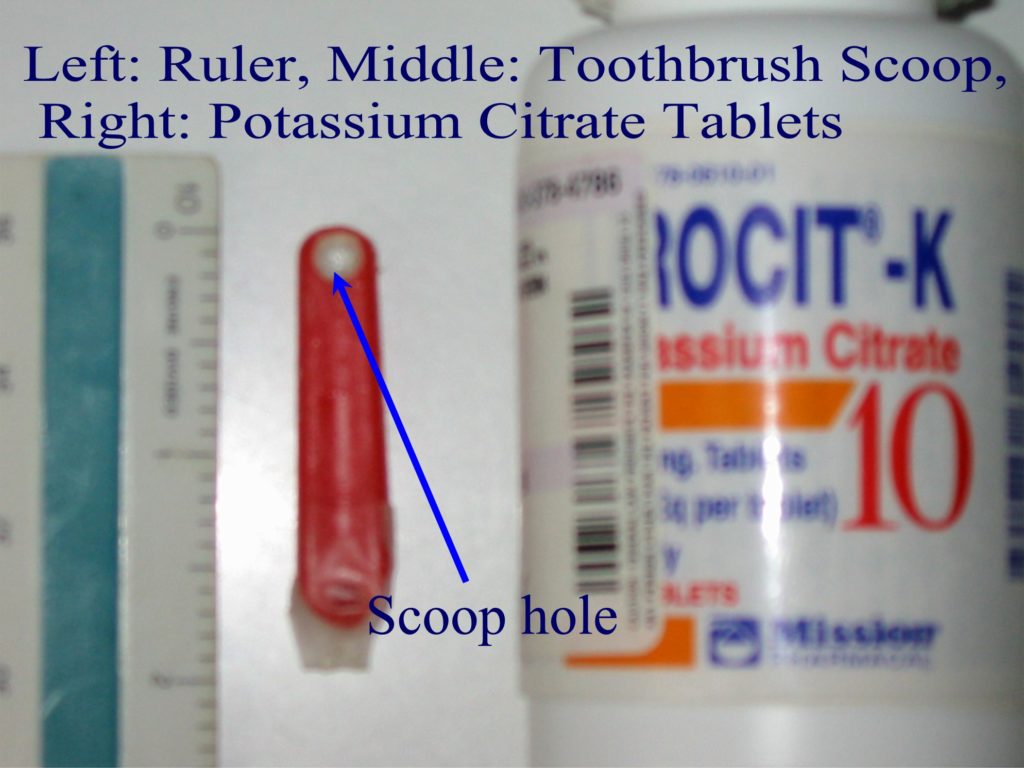Marshall Lev Dermer
Below I describe how I have used Potassium citrate (PC) powder to alkalize our dog’s urine and my tea.
Besides powder, you will need to reliably measure pH. I have used the indicator strips by Machinery-Nagel, pH-Fix 4.5-10.0. Indeed, one strip can be cut lengthwise into thirds. The powder and strips are available online. Do skip the next section if you are only interested in alkalizing tea.
Alkalizing Max’s Urine
Some 17 years ago, when our beloved Max, a Havanese, was about six years old he was diagnosed with calcium oxalate bladder stones. These were surgically removed, but how could recurrences be prevented?

One intervention required placing Max on a low oxalate diet. Such a homemade diet was formulated by Dr. Rebecca L Remillard of Veterinary Nutritional Consultations, Inc.
As calcium oxalate bladder stones form in acidic urine, a second intervention required alkalizing Max’s urine. Indeed, early each morning Max’s urine had been acidic at about pH 5.6. So, I was advised to increase the pH to between 6.5 and 7, and given a prescription for costly PC extended-release tablets. Once I finished the bottle, I purchased PC powder online, for a fraction of the prescription price.
Before using the powder, I wanted to understand how Max’s urine pH fluctuated throughout the day. So I sampled it immediately in the morning before his first feeding, around 5 pm before his second feeding, and around 10 PM.
His urine followed a circadian rhythm being most acidic in the morning and gradually became more alkaline. Because of this rhythm I decided to sprinkle twice as much powder on his evening meal than on his morning meal.
But how much powder should I use per day? The veterinarian was concerned that I not use too much. Max weighed about 15 lbs and I suspect that I started administering no more than 1/8th of a teaspoon of PC powder in total per day. By starting with a low dose and measuring his urine pH daily, in about a week, I found the necessary dose without harming Max.
To help with dosing, I made a scoop to measure the powder. I began by drilling a small hole in the handle of a discarded toothbrush. If the hole were too large I placed a tiny wad of aluminum foil in the hole.If the hole were too small I made it wider. To the left, in Figure 2, you can see a red toothbrush handle with a hole. To the right is the bottle from the costly prescribed medication.

From day to day, Max’s diet was rather constant. So when I, from time to time, checked his urine pH in the morning, it was between 6.7 and 7.0. Values later in the day were between pH 7.0 and 7.5. Over a period of months, I came to test his urine pH less frequently as the values were stable.
Our beloved Max did not suffer a recurrence of bladder stones and lived for 16 ¼ years.
Alkalizing Tea
As I am writing this, I am 75 years old. For most of my adult life I have had problems with heartburn. During my early 60’s I gave up drinking coffee and later tea, as they are both acidic.
About a year ago I had an idea. Why not alkalize tea with PC? It was easy to do because I already had pH paper and PC powder.
Before continuing I must note that I had my heartburn under good control. In particular, it had been at least two months since I had experienced heartburn during the day that continued across days. My primary problem had been nocturnal heartburn and that was now well controlled with omeparzole 40 mg in the morning and omeparzole 40 mg plus famotidine 40 mg in the evening.
I started with alkalizing black tea. I found that a cup of tea had a pH of about 5.6 (acidic). Some experimentation revealed that adding at least 1/8th teaspoon of PC powder raised the pH to about 7.0 (the pH of water here in Milwaukee, Wisconsin). Much the same occurred with Oolong tea. (I am a big fan of Iron Goddess of Mercy and Tung Ding Oolongs.) I have found that I can now drink three cups of tea evenings without heartburn. (BTW, I now rarely use pH indicators and have found that about 3/8th teaspoon of PC always works well, raising the pH to between about 7.0 and 7.3.)
I have corresponded with my gastroenterologist who suggested that besides tea being acidic, it also contained caffeine which itself can contribute to heartburn. I have not noticed a problem but I have not moved on to alkalize coffee.
Please send comments to marshall@dermer.com.